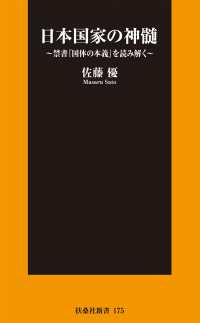基本説明
In "Exotic Nation," Barbara Fuchs explores the paradoxes in the cultural construction of Spain in relation to its Moorish heritage through an analysis of Spanish literature, as well as costume, language, architecture, and chivalric practices.
Full Description
In the Western imagination, Spain often evokes the colorful culture of al-Andalus, the Iberian region once ruled by Muslims. Tourist brochures inviting visitors to sunny and romantic Andalusia, home of the ingenious gardens and intricate arabesques of Granada's Alhambra Palace, are not the first texts to trade on Spain's relationship to its Moorish past. Despite the fall of Granada to the Catholic Monarchs in 1492 and the subsequent repression of Islam in Spain, Moorish civilization continued to influence both the reality and the perception of the Christian nation that emerged in place of al-Andalus.
In Exotic Nation, Barbara Fuchs explores the paradoxes in the cultural construction of Spain in relation to its Moorish heritage through an analysis of Spanish literature, costume, language, architecture, and chivalric practices. Between 1492 and the expulsion of the Moriscos (Muslims forcibly converted to Christianity) in 1609, Spain attempted to come to terms with its own Moorishness by simultaneously repressing Muslim subjects and appropriating their rich cultural heritage. Fuchs examines the explicit romanticization of the Moors in Spanish literature—often referred to as "literary maurophilia"—and the complex, often silent presence of Moorish forms in Spanish material culture. The extensive hybridization of Iberian culture suggests that the sympathetic depiction of Moors in the literature of the period does not trade in exoticism but instead reminded Spaniards of the place of Moors and their descendants within Spain. Meanwhile, observers from outside Spain recognized its cultural debt to al-Andalus, often deliberately casting Spain as the exotic racial other of Europe.
Contents
1. The Quotidian and the Exotic
2. In Memory of Moors: History, Maurophilia, and the Built Vernacular
3. The Moorish Fashion
4. Playing the Moor
5. The Spanish Race
Postscript Moorish Commonplaces
Notes
Bibliography
Index
-

- 電子書籍
- 今日もワタシが一番カワイイ 残念マウン…
-

- 電子書籍
- 復讐の赤線~恥辱にまみれた少女の運命~…
-

- 電子書籍
- きいろい女の子とくろい男の子 コンパス…
-

- 電子書籍
- PriPri - 2017年10月号
-

- 電子書籍
- 日本国家の神髄 扶桑社BOOKS新書



